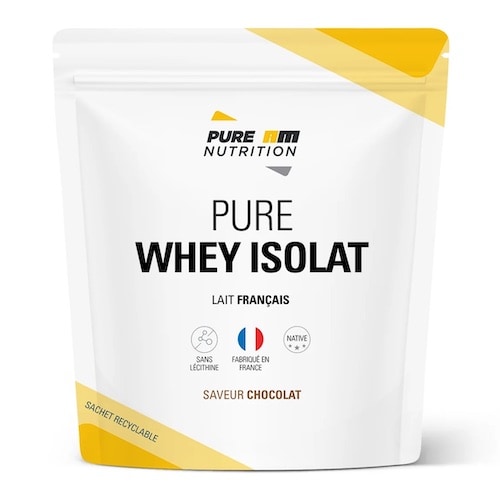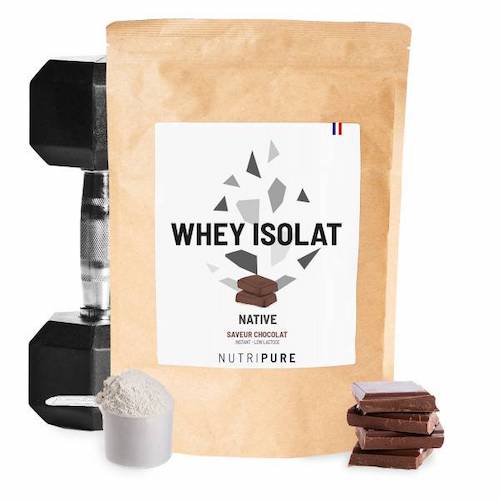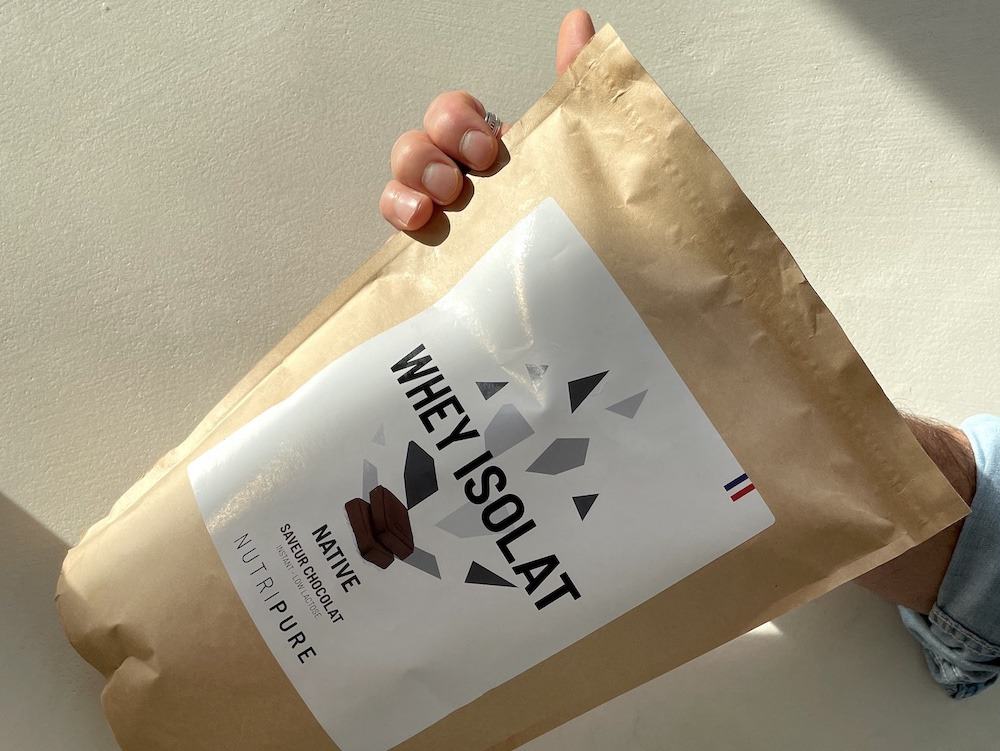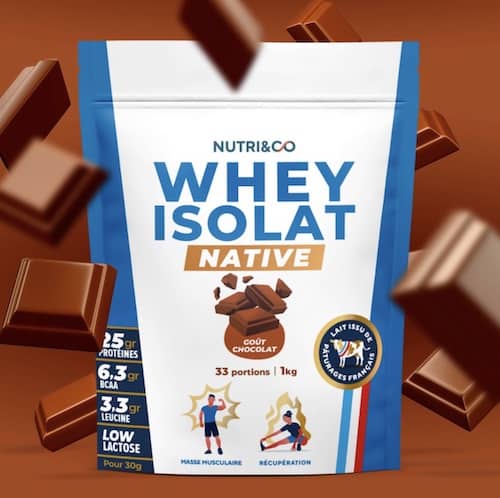Meilleure protéine whey 2025 : l’avis d’un diététicien (12 marques)
What are the best wheys on the market? Maxime Messegué, dietitian nutritionist, analyzed in detail 12 brands according to 6 quality criteria to create this benchmark comparison. Discover the top 3 whey proteins to maximize your mass gain and weight loss goals.
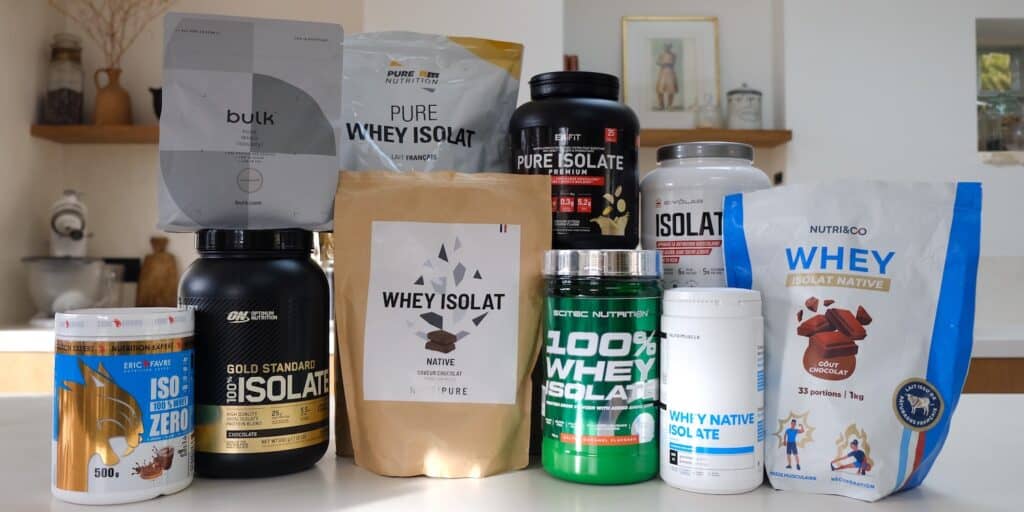
📊 60+ nutrition comparisons published since 2019
🧑🔬 Expert team: dietitians, pharmacists, sports coaches, doctors
🎙️ Authors of the book Les aliments bénéfiques and the podcast Révolutions Alimentaires
MY SELECTION
#1: Best Value for Money 🥇
> PURE Whey Isolate Native – AM Nutrition
#2: Best Premium Whey
> Whey Isolate Native – Nutripure
Whey comes from the dairy industry, originating from milk whey, or whey. The whey is obtained at the time of milk coagulation during the cheese-making process.
This whey mainly contains lactose and small soluble proteins rich in essential amino acids. Its biological value (degree of assimilation and quality of amino acids) is 104 to 114, making it one of the best proteins.
It is better understood why athletes have made a habit of consuming it to meet their protein needs and to increase their muscle mass.
{{{TEMP_MARK_48}}}To see more clearly, I tested and compared 12 of the best-selling wheys on the Internet, rated them based on 6 criteria, and then selected the top 3 products.
Tested Brands: AMFIT, BiotechUSA, Bulk, EAfit, Eiyolab, Foodspring, NU3, Nutri&Co, Nutripure, Optimum Nutrition, Pure AM Nutrition, Scitec Nutrition.
We evaluate all dietary supplements independently. If you click on one of the provided links, a commission may be paid to us, without affecting the price or ranking.
My 6 Selection Criteria
To create this comparison, I determined 6 qualitative criteria based on product characteristics and my test of each of the 12 whey proteins.
{{{TEMP_MARK_83}}}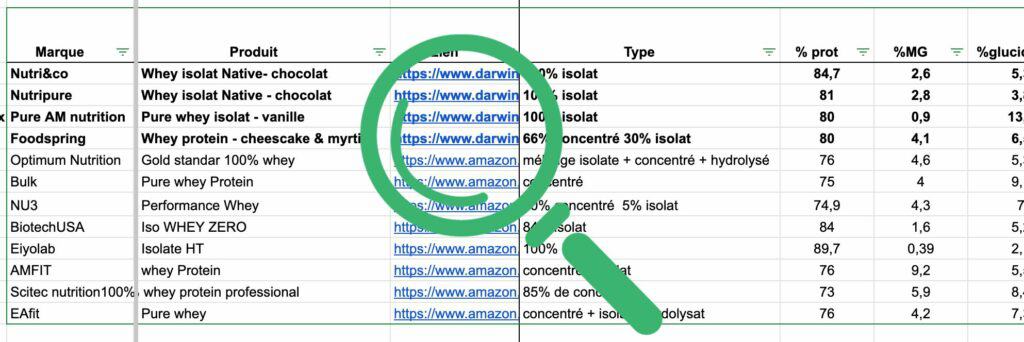
→ Access my complete comparison table here (Google Sheet)
1. Nutritional Value
To evaluate the nutritional value of a whey, I relied on the protein content on one hand, and the BCAA content on the other.
Wheys with less protein contain more fats and carbohydrates; therefore, their score is lower. The richer a whey is in BCAA, the more effective it is in muscle building.
2. Safety
To rate the safety of different wheys, I based it on 4 sub-criteria:
- The origin of the milk used and how the cows are fed. Thus, pasture or grass-fed cows produce better quality milk than cows from intensive farming.
- The native quality or not. When whey is native, the filtration is done cold, which maintains the full integrity of the proteins.
- The number of additives and texture agents. Most of the texture agents used are not controversial, but their presence in large quantities is not ideal for the body. On a daily basis, it is best to consume products with the shortest possible recipe.
- The sweeteners used. There are 3 types, sucralose, acesulfame K, and steviol glycoside. The first two are controversial, while steviol glycoside seems harmless for now.
3. Brand Reputation
{{{TEMP_MARK_38}}}I also relied on the Instagram community as well as reviews found on Amazon and review sites like Trustpilot or Verified Reviews.
4. Solubility
A whey that mixes well and doesn’t clump is pleasant to consume. Therefore, I tested the solubility of the 10 brands by mixing 30 g of whey in 250 ml of water in a shaker. An identical mixing time of 10 seconds was applied for each whey.
5. Taste
This part is more subjective, so I relied on my personal tastes!
{{{TEMP_MARK_143}}}- The texture, favoring creamy textures
- The intensity of the sweet taste, favoring less sweet wheys. {{{TEMP_MARK_84}}}
6. Packaging Durability
Because waste reduction concerns us all, I also evaluated the type of packaging used, favoring brands that limit the use of plastic.
Best Whey: My Opinion
#1: BEST VALUE FOR MONEY 🥇
AM Nutrition: 4.3/5
Nutrition : ★★★★☆
Sécurité : ★★★★☆
Marque : ★★★★☆
Solubilité : ★★★★☆
Goût : ★★★★★
Pack : ★★★☆☆


PURE AM Nutrition is a French brand founded in 2017, specializing in dietary supplements for athletes. Its mission is to offer high-quality products with simple compositions at unbeatable prices.
{{{TEMP_MARK_44}}} {{{TEMP_MARK_{{{TEMP_MARK_184}}}}}}AM Nutrition’s whey is native, not from a by-product of the cheese industry but directly from milk, thus it is of higher quality since no heat treatment is used for protein extraction. The milk used is French.
This is the only whey in our test that contains no additives or texturing agents. That’s a very good thing! Its sweet taste comes from a blend of sweeteners: steviol glycoside (natural) and sucralose (chemical and sometimes controversial).
I tested the AM Nutrition vanilla-flavored whey. I liked its pleasant and appropriately sweet taste. I was less fond of the rather liquid texture with a foamy surface and a few lumps. This texture likely results from the absence of texturing agents in the formula.
This native whey isolate is sold at a very reasonable price considering its premium quality and formulation. The price is €42.71 per kilo.
For me, this is the whey with the best value for money.
#2: BEST PREMIUM WHEY
Nutripure: 4.7/5
Nutrition : ★★★★★
Sécurité : ★★★★★
Marque : ★★★★☆
Solubilité : ★★★★★
Goût : ★★★★☆
Pack : ★★★★★
Nutripure’s Native Whey Isolate cocoa flavor contains 81 g of protein per 100 g with 17.9 g of BCAA per 100 g. It also contains 2.8 g of fat and 3.8 g of carbohydrate. The carbohydrates come from the presence of low-fat cocoa and not from lactose as it contains less than 0.2%.
This whey is native, derived from fresh French pasture milk. The proteins are isolated by cold micro-filtration, thus they remain intact and not denatured by heat treatment.
Nutripure avoids any controversial substances for taste, using natural flavors and only one natural sweetener, steviol glycoside. Derived from stevia, this sweetener is the safest on the market.
The powder mixes very well, it doesn’t clump, and its taste is really good. The cocoa content of the product provides a gourmet side without an artificial aftertaste.
I really appreciate the simple and clean packaging of Nutripure, which uses an aluminum pouch covered with kraft paper. There is a real effort to minimize waste as much as possible.
{{{TEMP_MARK_39}}}#3: BEST ALTERNATIVE
Nutri&Co: 4.7/5
Nutrition : ★★★★★
Sécurité : ★★★★★
Marque : ★★★★☆
Solubilité : ★★★★★
Goût : ★★★★★
Pack : ★★★★☆

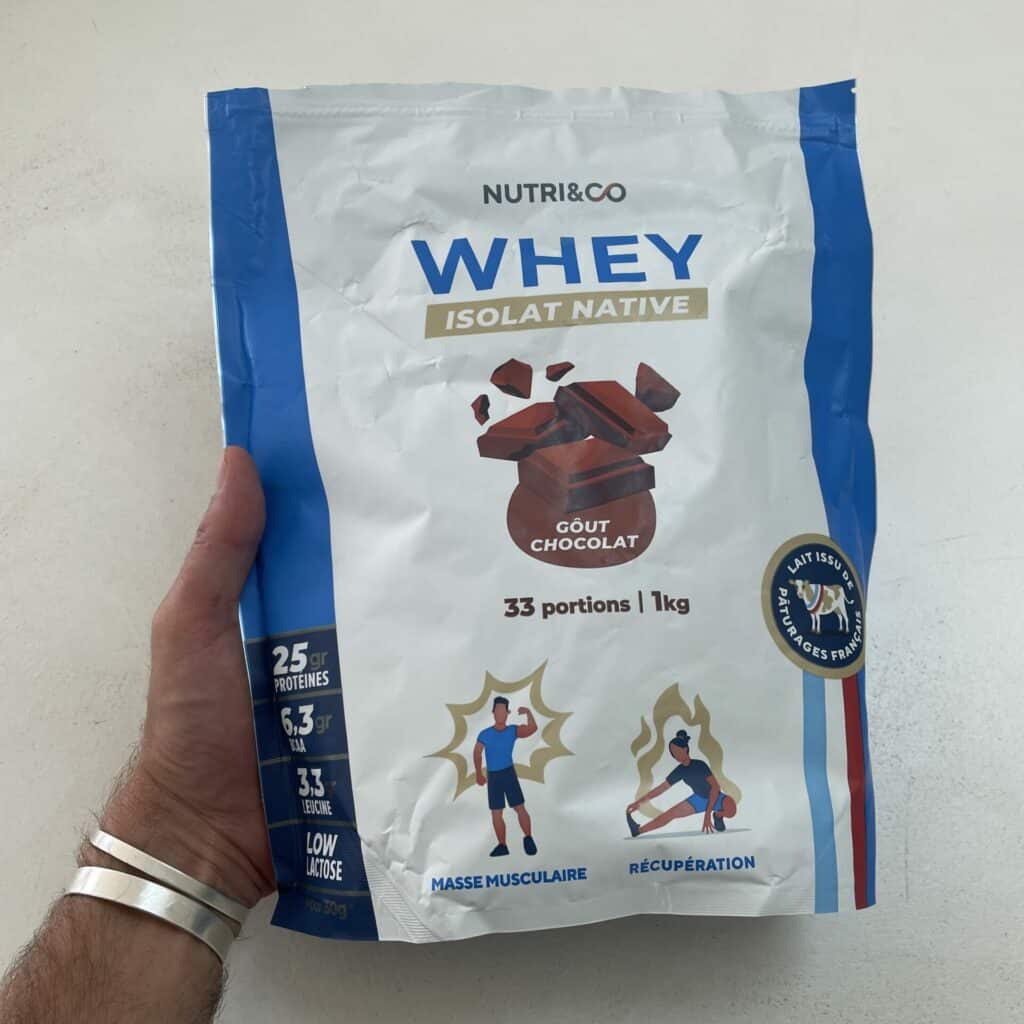
Nutri&Co is a French brand created in 2017. It specializes in selling dietary supplements aimed at improving health, beauty, and sports performance. Its goal is to offer the best possible quality with simple formulas and no controversial ingredients, at a fair price.
Nutri&Co’s chocolate-flavored isolate and native whey contains 85g of protein per 100g with 24.8g of BCAA. This composition is very rare for a whey, it reflects exceptional milk quality.
Nutri&Co’s whey is native, so it doesn’t come from cheese industry whey but directly from milk. The proteins are cold-extracted through micro-filtration, which preserves their quality.
{{{TEMP_MARK_76}}}Nutri&Co’s whey contains only 2 additives: xanthan gum and sunflower lecithin. They are not controversial.
The brand has chosen not to use chemical sweeteners. For the sweet flavor, only steviol glycoside (from stevia) is used.
The powder mixes well and does not clump, its chocolate flavor is pleasant, without a chemical aftertaste. The only downside, I find it unfortunate that the packaging is plastic and not paper.
This whey is among the most expensive on the market at €49.90 per kg, but quality comes at a price.
Complete Comparison
| {{{TEMP_MARK_153}}} | {{{TEMP_MARK_1{{{TEMP_MARK_176}}}}}} | %protein | |
|---|---|---|---|
| Best quality/price ratio 🥇 > AM Nutrition – PURE Whey Isolate | 4.3 | 43 | {{{TEMP_MARK_173}}} |
| Best premium whey > Nutripure – Whey Isolate Native | 4.7 | 53 | {{{TEMP_MARK_175}}} |
| Best premium alternative > Nutri&Co – Whey Isolate Native | 4.7 | {{{TEMP_MARK_176}}} | 83 |
| 4. Foodspring – Whey protein | 4.3 | 44 | {{{TEMP_MARK_173}}} |
| {{{TEMP_MARK_126}}} | 4.0 | 39 | 76 |
| {{{TEMP_MARK_139}}} | 3.8 | 38 | 75 |
| 7. NU3 – Performance Whey | 3.8 | {{{TEMP_MARK_184}}} | 74.9 |
| 8. BiotechUSA – Iso WHEY ZERO | 3.8 | 48 | 84 |
| 9. Eiyolab – Isolate HT | 3.7 | 47 | 89.7 |
| {{{TEMP_MARK_144}}} | 3.7 | 26 | 76 |
| {{{TEMP_MARK_1{{{TEMP_MARK_184}}}}}} | 3.3 | 48 | 73 |
| 12. EAfit – Pure whey | 3.2 | 39 | 76 |
→ Access my complete comparison table here (Google Sheet)
The different types of whey
Concentrated Whey
Concentrated whey is the most used and sold whey. It mainly comes from the cheese industry.
In the cheese-making process, casein (solid proteins used in cheese-making) is separated from the whey or whey serum using high-temperature heat treatment. This process denatures some of the proteins. The whey is then dehydrated to produce concentrated whey.
It contains about 80% proteins, but also fats and lactose. It is relatively inexpensive.
Native Whey
Native whey is a whey that does not come from the cheese industry; the whey is separated from the casein by cold filtration directly from the milk. There is no denaturation of the proteins.
{{{TEMP_MARK_{{{TEMP_MARK_173}}}}}}Whey Isolate
Whey isolate is a concentrated whey that has undergone additional filtration. It is stripped of a significant portion of its fats and lactose.
It is particularly interesting for people who are lactose intolerant, or those who want to minimize calorie intake.
{{{TEMP_MARK_75}}}Note that a whey can be both native and isolate. This represents the best quality on the market.
{{{TEMP_MARK_{{{TEMP_MARK_176}}}}}}Hydrolyzed Whey
{{{TEMP_MARK_47}}} {{{TEMP_MARK_{{{TEMP_MARK_175}}}}}}The proteins it contains are thus very quickly assimilated and well tolerated. It is therefore aimed at people with digestive issues, or athletes requiring immediate protein intake.
Vegan Whey
{{{TEMP_MARK_73}}}On the other hand, there are more and more plant-based protein powders, suitable for vegetarian or vegan diets. These products typically contain a mix of various types of plant proteins usually derived from peas, rice, hemp, soy, etc.
📚 Read also | Comparison of the best plant-based proteins in powder form
Frequently Asked Questions (FAQ)
What is whey used for?
Whey is a protein substitute that helps meet increased needs during intensive sports practice. Its amino acid composition is very interesting, making it a quality choice for promoting good muscle growth.
Furthermore, its proteins are small and quickly assimilated, making them readily available after physical exercise, thereby optimizing recovery.
How much whey should be consumed per day?
The amount of whey you need depends on various factors: your protein needs, the intensity of your physical effort, your goals, and the amount of protein in your daily diet.
However, someone looking to increase their protein intake might start with 30 grams a day after a workout to promote muscle recovery.
How many times a day can you take whey?
This again depends on your protein intake from your daily diet and your needs. It’s impossible to generalize.
For instance, someone who consumes a lot of meat products will not have the same needs as someone who eats very little.
Where to buy whey?
Whey can be purchased in specialized fitness stores as well as some large sports retailers. It can also be found in some pharmacies.
For this article, we bought whey on Amazon or directly from brands via their online stores.
When to take whey?
Ideally, it is preferable to consume whey separate from meals, after sporting activities. It is also possible to consume it during meals to increase protein intake.
Whey or casein?
Whey, or whey protein, comes from the liquid part of milk. It consists of the soluble proteins in milk. These proteins are small, very digestible, and quickly assimilated, which is very useful for quickly delivering proteins to the muscle when needed.
Casein comes from the solid part found in dairy products (yogurt, fromage blanc, skyr, cottage cheese, etc.). Caseins are large proteins that take longer to be digested by the body and are sometimes poorly tolerated.
The use is not the same as whey: casein is generally used in the evening in addition to whey to provide proteins during the night, preventing muscle catabolism.
Casein is only recommended for certain sports practices, such as bodybuilding with high protein requirements.
Whey or BCAA?
If whey is of good quality, it contains a good amount of BCAA.
BCAAs are branched-chain amino acids that allow for muscle building and recovery. There are 3 of them: valine, leucine, and isoleucine. They are called essential amino acids because the body is not able to synthesize them on its own. They must therefore necessarily come from food.
Without them, muscle building is impossible and other amino acids will not be used properly.
Taking BCAA capsules before a workout can be interesting to limit muscle catabolism during intense sessions. However, it is not necessary to add them to whey if it is of good quality.
📚 Read also | Comparison of the best BCAA
Whey or creatine?
Creatine is an amino acid derivative, it is naturally present in the body and mainly in muscle fibers and the brain. It is synthesized by the kidneys, liver, and pancreas, from 3 amino acids: arginine, glycine, and methionine.
Creatine is an energy precursor for muscles, it helps improve sports performance, particularly in strength and bodybuilding sports.
It has nothing to do with whey, which helps improve recovery and muscle growth.
📚 Read also | What is the best creatine on the market?
Does whey help you lose weight?
No, whey is not made to lose weight but to facilitate muscle mass growth. However, when muscle mass develops, it increases your basal metabolism. In this context, whey can indirectly help with fat loss, provided there is a calorie deficit in the body.
Are there any dangers and contraindications to consuming whey?
If there is no excess and whey meets the body’s natural protein needs, there is no danger in consuming it.
To be useful and not harmful, whey consumption should be associated with a varied and balanced diet.
Caution: people suffering from renal insufficiency need to control their protein intake. In this case, it is recommended not to consume it without medical advice.
Is whey essential for muscle building?
No, whey is absolutely not essential for gaining muscle mass! It is entirely possible to do without it by being careful about protein intake with traditional foods.
Whey is a practical and economical boost to meet protein needs, but it is not indispensable.
Summary of my selection
{{{TEMP_MARK_43}}}# Best premium whey
> Whey Isolate Native – Nutripure
# Best premium alternative
> Whey Isolate Native – Nutri&Co

